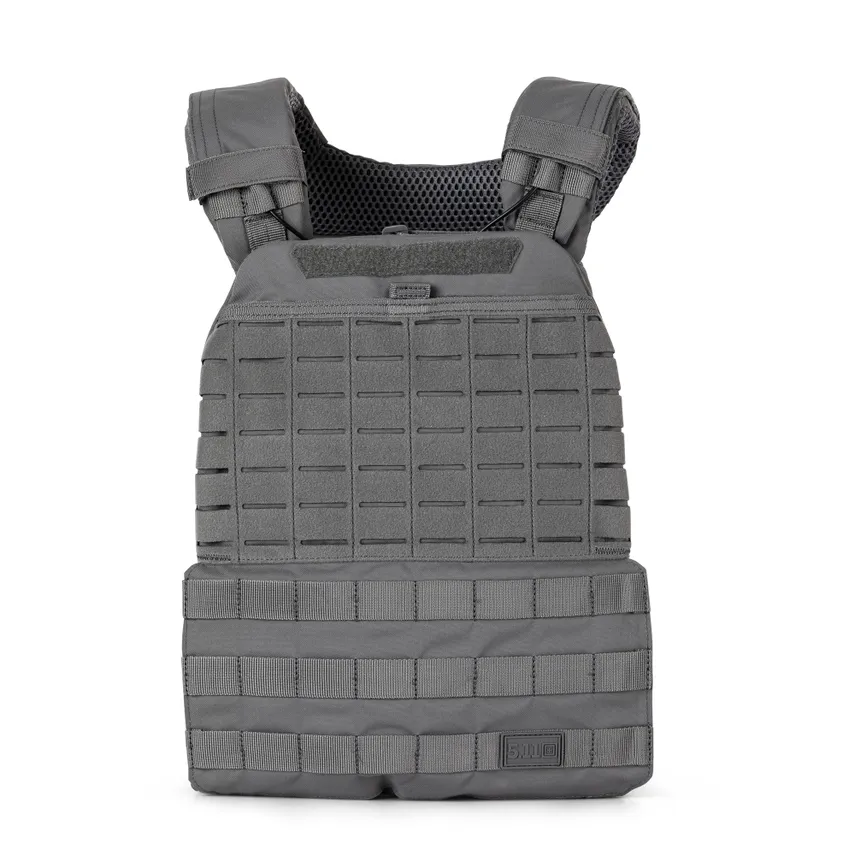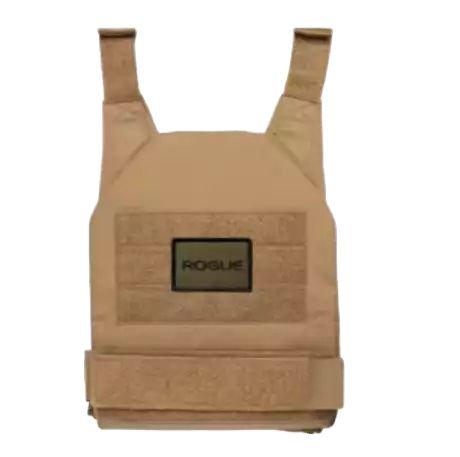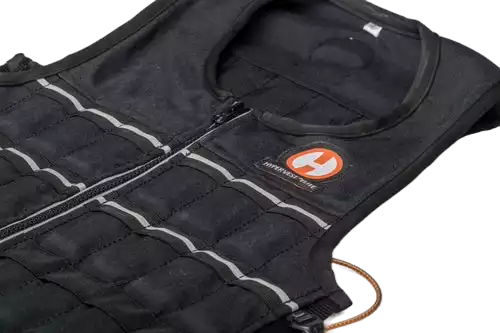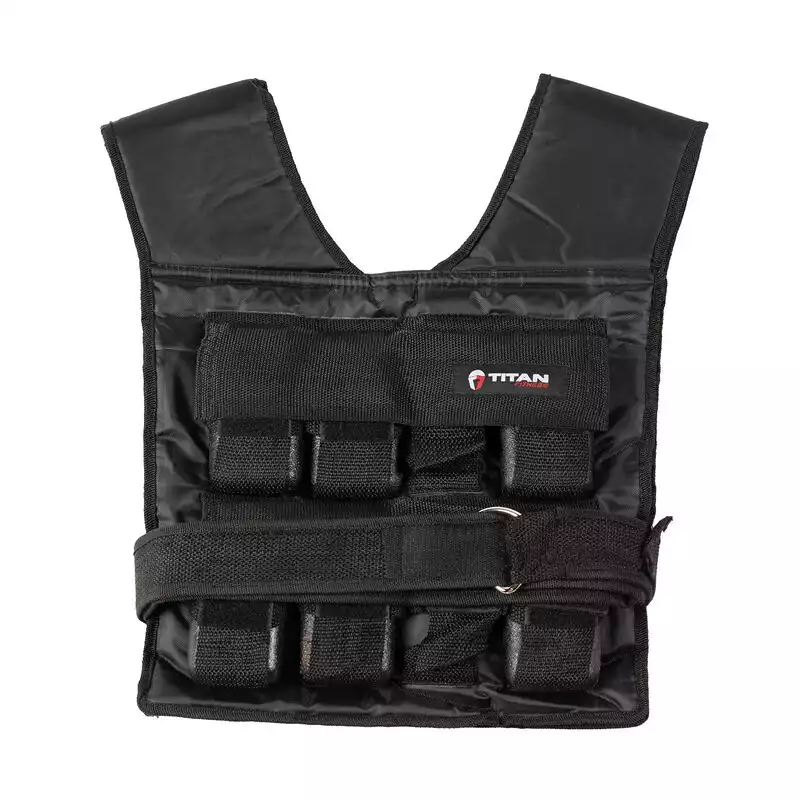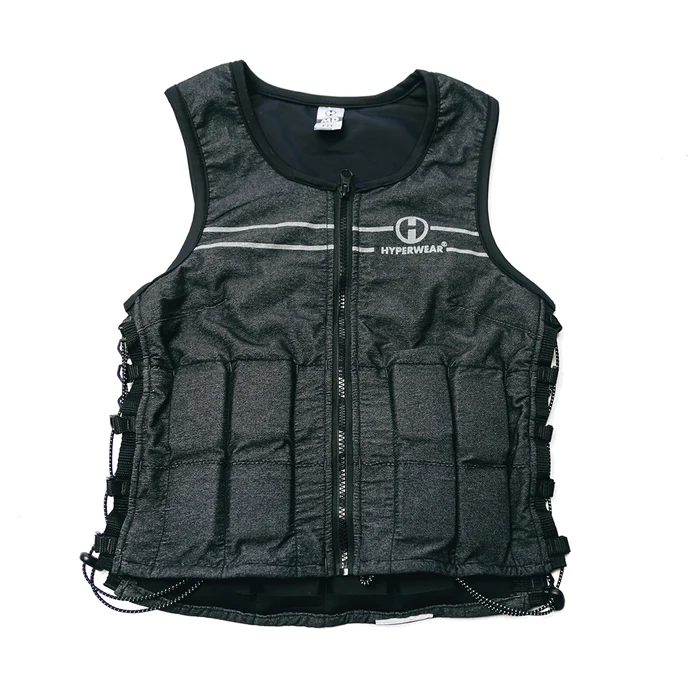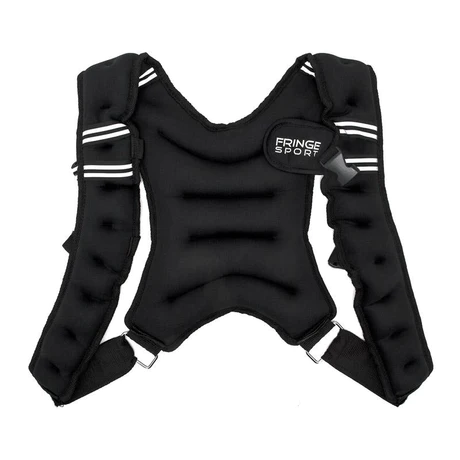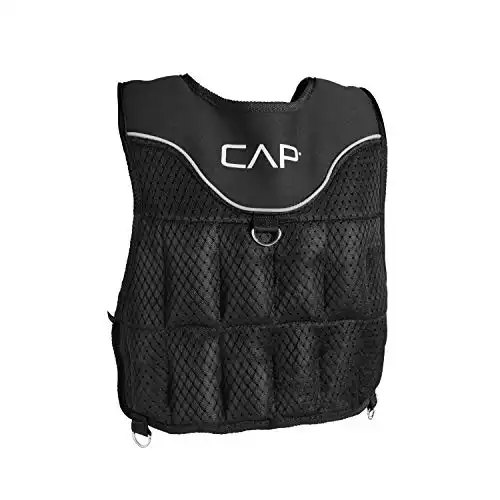Health & Fitness
The Best Weighted Vest of 2023, According to Fitness Experts
A weighted vest can be an excellent solution if you want to elevate your fitness routine at home but don’t have the space or budget for multiple pieces of gym equipment. It can help you burn more calories, build muscle, improve your stamina and endurance, promote better posture, and strengthen your joints.
I’ve done CrossFit off and on for the past eight years, so I’m no stranger to wearing a weight vest while working out. As a fitness writer, I’ve also researched dozens of weighted vests over the past few years, so I know which products offer the best quality and value. In the roundup review below, I combine all of my experience and research to bring you what I believe are the seven best weighted vests.
How We Chose the Best Weighted Vest
The Breaking Muscle team includes CrossFitters, certified personal trainers, strength and conditioning coaches, and fitness enthusiasts who train extensively with all kinds of equipment, including weight vests. We selected the best weighted vests based on our personal experience and the feedback we’ve received from other individuals we work out with frequently.
Breaking Muscle also has a testing facility that’s stocked with fitness equipment. The list below includes weight vests our reviews staff has worn for various types of workouts, such as CrossFit workouts of the day (WODs), running, and bodyweight exercises.
Our Top Picks for the Best Weighted Vests
Best Weighted Vest Overall: 5.11 Tactical TacTec Plate Carrier
Pros
- Available in several colors
- Oversized airflow panels to help you stay cool and comfortable
- Adjustable straps on the shoulders and waist allow you to get a custom fit
- Can attach accessories like a hydration pack to the MOLLE webbing
- Back yoke shoulder pads help with weight distribution
Cons
- Expensive
- Weights aren’t included
We chose the 5.11 Tactical TacTec Plate Carrier as the best overall weighted vest because of its durability, construction quality, versatility, comfort, and functionality.
I haven’t used this weight vest myself, but I know several CrossFitters who own one, and they speak highly of it. It’s even used during certain events in CrossFit competitions and the CrossFit Games, so you know it can handle the toughest workouts. It’s made with 500D nylon, a rugged material commonly used in military and tactical gear. A relatively open design on the sides allows for a full range of motion whether you’re doing bodyweight exercises or cardio workouts.
The shoulder straps converge on the back to help keep the weight evenly distributed, and the inner padding makes the straps comfortable on the upper body during long workouts like Murph. Oversized airflow panels help keep you cool. The plate carrier also features a MOLLE (modular, lightweight load-carrying equipment) loop and webbing, which is useful for packing gear like a hydration pack or first aid kit if you want to wear the vest for a long ruck.
There are no sizes available, but 5.11 Tactical claims that the plate carrier fits sizes S to XL. The waistbands are made with stretch technology, and the shoulder straps are adjustable, so most individuals can get a customized, snug fit. Adjusting the vest may require some effort because there are a lot of Velcro straps, though 5.11 Tactical has a YouTube video explaining the process. And unless you gain or lose a significant amount of weight, you shouldn’t have to adjust the fit more than once.
If aesthetics are important to you, you’ll likely appreciate that the TacTec Plate Carrier is available in multiple colors, including ranger green, black, camo, gray, navy, and kangaroo (a khaki color). You can also attach patches to the front if you want to rep your favorite brands.
A couple of drawbacks are that the plate carrier costs over $200 and doesn’t come with plates. You can purchase weight vest plates from 5.11 or Rogue, but they’ll add at least $50 to the overall cost of the vest. However, the quality and durability of the TacTec Plate Carrier are hard to find in other weight vests. If you know you’ll put yours through a lot of abuse, the extra cost may be worth it.
RELATED: Best Resistance Bands for Building Muscle, Resistance Training, and More
Best Weighted Vest for CrossFit: Rogue Plate Carrier
Pros
- American-made
- Low-key design
- Reinforced stitching for enhanced durability
- Available in four colorways
- A portion of the proceeds are donated to the Operator Foundation
Cons
- Weight plates are sold separately
- No storage pockets
Few weight vests can stand up to demanding CrossFit workouts like the Rogue Plate Carrier. It’s made with a combination of 1000D and 500D Cordura, which is common amongst the toughest and highest quality weight vests, and features anti-abrasion capabilities to prevent it from snagging or ripping.
There is also reinforced stitching and super sticky Velcro throughout the vest, helping to reduce the likelihood of the seams coming undone or the weight plates from falling out.
The craftsmanship and streamlined profile also make it the best weight vest for workouts like Murph. Because it fits flat weight vest plates, there aren’t any bulky, thick weights that can dig into your torso when your chest touches the floor during push-ups. Plus, this plate carrier allows for a full range of motion and won’t prohibit movement of your upper body when running or performing pull-ups.
The interior contains foam padding for extra comfort against the body and shoulders. The stretch woven fabric and the elastic at the back of the waist strap enable you to get a secure fit. The plate carrier is only available in sizes S to L, though the large can accommodate a waist circumference of up to 50 inches.
The shoulder straps are thin and have a tendency to dig into the shoulders, but Rogue offers a shoulder pad set that can provide extra support. However, this set costs around $20 extra. While this isn’t a significant cost, keep in mind that the vest costs around $135 and doesn’t come with plates. Weight vest plates from Rogue start at around $85. If you want to purchase the plate carrier, the shoulder strap set, and weight plates, you may be spending close to $240 or more.
The Rogue Plate Carrier comes in four colorways: black, coyote brown (a khaki color), gray, and ranger green. While the colors are a bit drab (the vest is inspired by military gear, after all), you can add Velcro patches to the front or back if you want to liven it up a bit.
There are no storage pockets for things like car keys or a cell phone, but Rogue markets this plate carrier as a streamlined, back-to-basics weight vest. If you’re looking for simplicity, you’ll find it here. Furthermore, Rogue donates a portion of the proceeds from all sales of the plate carrier to the Operator Foundation. The Operator Foundation helps fund educational opportunities and scholarships for special operations members and their families.
This may be the weight vest for you if you’re looking for a highly durable option and want to support service men and women and their family members.
RELATED: Best Dumbbell Sets for Strength Training, HIIT, and More
Best Weighted Vest for Running: Hyperwear Hyper Vest Elite
Hyperwear Hyper Vest Elite
- Material: Cordura
- Adjustable: Yes
- Weight range: Comes pre-loaded with 10 pounds and an additional five to 10 pounds, depending on which size you get
- Available sizes: S to XL
Pros
- Unisex design
- Made with odor-resistant fabric
- Reflective striping
- Lack of side panels prevents chafing under the arms and allows for more ventilation
Cons
- Expensive
- No storage pockets for keys, a cell phone, or a water bottle
A weighted vest meant for running should fit snugly so that it doesn’t bounce around as you move. It should also allow enough airflow so that you don’t overheat when training outdoors. The Hyperwear Hyper Vest Elite fits the bill thanks to its use of thin Cordura fabric and its fitted, contoured design. It also has reflective striping that enables you to stay more visible when running outside in the dark.
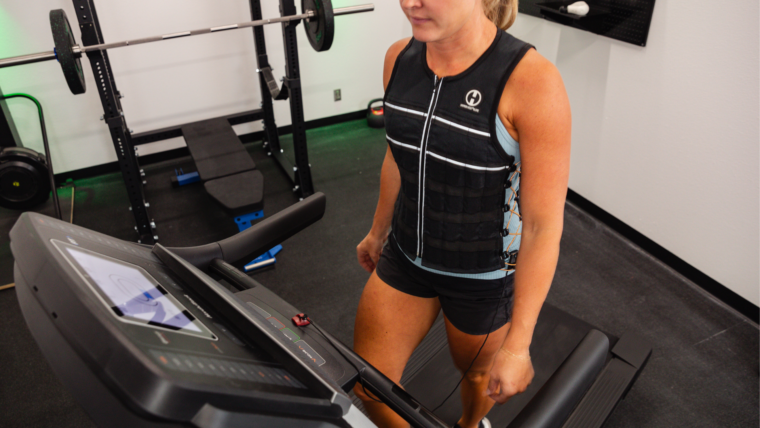
I had a chance to wear this vest at our testing facility and it was lightweight, flexible, and much more comfortable to wear for dynamic exercises than the weight vest I own (which is a similar style as the Titan Fitness Adjustable Weight Vest).
My favorite thing about this vest is that there are no side panels. Instead, the sides simply feature laces that you can use to adjust the fit. Not only does this allow for more ventilation but it also means there’s no fabric under the arms that can cause chafing.
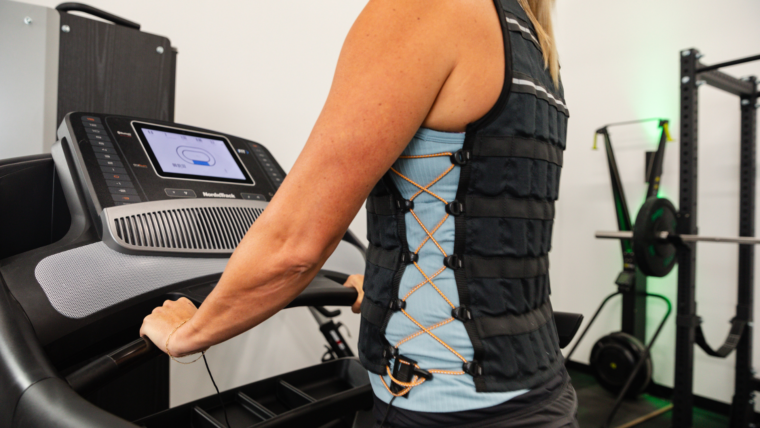
The vest comes pre-loaded to 10 pounds. Depending on which size you order (S to XL), you get an additional five to 10 pounds worth of plates in 2.25-ounce increments. Unlike other vests that fit one large weight plate or several small but bulky plate bars, the Hyper Vest Elite carries relatively flat bars. The more compact plate design plus the smaller weight increments allow for better weight distribution, resulting in a vest that’s much less cumbersome than other vests.
Priced at over $200, the Hyperwear Hyper Vest Elite is one of the more expensive options on our list. Additionally, I wish there were pockets for a phone, a set of keys, and/or a water bottle so that you don’t have to carry these items in your hand or wear a separate belt during your run. But if comfort is a bigger priority for you, the Hyper Vest Elite is worth considering.
RELATED: Sprinting With a Weighted Vest: Help or Hindrance?
Best Adjustable Weighted Vest: Titan Adjustable Weight Vest
Pros
- Rounded edges on the weights to prevent wear and tear on the pockets
- Can distribute the weights throughout the front or back as desired
- Extra long 64.5-inch belt allows you to get the fit you need
Cons
- Weights can be bulky
- Seams can come undone in the wash
- Shoulder straps aren’t adjustable
If you want the freedom to change the amount of weight in your vest based on how you feel on any given day, the Titan Adjustable Weight Vest can be a solid choice.
It comes with eight 2.5-pound oblong-shaped steel weights, allowing you to load the vest with up to 20 pounds. There are eight pockets on the front and eight on the back, so you can technically distribute the weights in various ways. However, I recommend loading them evenly to prevent excess strain on one side of the body. Super sticky Velcro flaps help keep the weights secure. Because the weights are rounded, they won’t cause extra wear and tear on the pockets.
Titan doesn’t disclose the type of material it uses for this vest on the website. I contacted the support staff, who told me that the vest is made with abrasion-resistant fabric. Customer reviews suggest that the vest is durable, but how long it lasts will likely depend on how often you use it and what kind of workouts you use it for.
The Titan Adjustable Weight Vest doesn’t come in sizes, but it has a padded 64.5-inch belt that allows you to adjust the fit to your body. The padded shoulder straps help relieve pressure on the upper body, though they aren’t adjustable. This means you won’t be able to adjust where the vest sits on your torso, which may be an issue if you want the weight to sit higher or lower on your body.
I don’t have this exact vest, but I have one whose weights are similar to the ones that come with the Titan Adjustable Weight Vest. In my experience, weighted vests with these types of weights are better for walking, going on the elliptical, or doing static exercises like squats or lunges. I find the thicker weights to be too bulky to do movements like burpees, as they can be uncomfortable on my stomach when my upper body touches the floor.
Another potential drawback is that the seams can come undone if you throw the vest shell in the washing machine. To avoid this issue, I recommend hanging it up to air out after each use to prevent odors from building up on it. If you do have to clean it, spot cleaning as needed may be a better option.
All that said, this vest is pretty affordable at around $80, compared with other options that cost at least $200. Plus, the weights are included, preventing you from having to spend even more money.
RELATED: Best Cardio Machines for Weight Loss, Low-Impact Workouts, and More
Best Weighted Vest for Women: Hyperwear Hyper Vest FIT
Pros
- The shell is machine washable
- Snug fit prevents it from bouncing around during exercise
- No weights on the chest helps prevent discomfort around the bust
Cons
- Doesn’t go heavier than 10 pounds
- No inclusive sizing
- Not designed for high-impact activities
The Hyperwear Hyper Vest FIT is specifically designed with women in mind. Featuring durable Cordura fabric with one-way stretch construction, it contours to the shape of a woman’s body. It doesn’t have any weights on the top of the chest, making it easier for you to breathe and helping to prevent discomfort on the bust area.
The satin lining feels smooth on the skin if you only wear a sports bra underneath the vest. However, satin is not a very breathable material, so there is a risk of overheating if you wear the vest in a hot climate. On the other hand, like the Hyperwear Hyper Vest Elite, there are no side panels on the Hyper Vest FIT. Instead, there are adjustable laces on the sides, and this open design allows for more ventilation. Additionally, the shell is machine washable, so you can easily wash any sweat out of it if needed.
The half-pound steel shots that come with the vest are encased in hard plastic, which helps to prevent the weights from spilling or leaking. You can choose between a five-pound or 10-pound vest. This may not be heavy enough for advanced female athletes or female CrossFitters (CrossFit workouts that require a weighted vest typically call for a 14-pound vest for women). Furthermore, Hyperwear states that the vest isn’t designed for high-impact activities. Still, it is suitable for women who want to add some resistance to their walks, hikes, or bodyweight workouts.
Another drawback is that it is only available in small, medium, and large sizes. As a larger athlete myself, I would have liked to see more inclusive sizing. While I haven’t personally tested this vest, I have tried a size large in another one of Hyperwear’s vests, and it was pretty snug. The adjustable laces on the sides do allow you to adjust the fit, but you can only loosen them so much. If you carry any extra weight in your midsection or chest area, the large may not fit comfortably.
Best Weighted Vest for Walking: Fringe Sport WODmaster Weight Vest
Pros
- Six points of adjustment allow you to get a snug fit
- Reflective strips to improve visibility when walking in the dark
- Open design allows for more comfort on the upper body
Cons
- Only available in 20 pounds
- May have issues with durability
- Neoprene material may trap odors
When using a weighted vest for walking, you don’t want it to put too much pressure on your chest and limit your ability to breathe. A vest like the Fringe Sport WODmaster Weight Vest is ideal because it has an open design that allows your chest to expand more easily when you need to catch your breath.
This weighted vest looks almost like a flat, small backpack. Instead of covering a large portion of your upper body, it ends at around the bottom of the lats (the two large flat muscles on either side of the middle and upper back), and the curved shoulder straps leave the upper torso mostly exposed. Two quick-release buckles sit on the upper and lower chest, but they are only a couple of inches wide and help relieve the pressure of the weight from crushing your chest.
The vest has six points of adjustment, allowing you to get a snug, comfortable fit, so you can worry more about your walk and less about the weight shifting. There are also reflective strips on the front and back to help you stay visible when walking in the dark.
Because the Fringe Sport WODMaster Weight Vest is made with neoprene, which isn’t as durable as other materials like Cordura, it may not last long if you use it for high-impact workouts in addition to walking. Neoprene is also known for trapping odors from sweat. Because Fringe Sport uses sand for the weight, the vest isn’t conducive to machine washing. You’ll want to hang it up to air dry after each use to prevent odors from building up.
Another drawback is that the vest is fixed at 20 pounds. It may not be suitable for beginners or even those who already walk a lot but have never done so with a weight vest.
RELATED: Best Treadmills for Home for Running, Walking, and More
Best Budget Weighted Vest: CAP Barbell Adjustable Weighted Vest
Pros
- Has the ability to go up to 50 pounds, depending on the version you purchase
- The 20-pound vest comes with a cell phone pocket
- One size fits most
- Price starts at less than $50
Cons
- Durability may be an issue
- Padding on the shoulder straps could be thicker
- The weighted bags it comes with are prone to leaking
For budget-conscious shoppers, the CAP Barbell Adjustable Weighted Vest can be an excellent choice. It starts at around $43, whereas many other options cost $100 to $200. And since it’s on Amazon, Prime members will also benefit from free shipping, resulting in even more cost savings.
This vest comes in several weight options. You can choose a vest that allows you to adjust the weight to 20, 30, or 50 pounds, with each vest coming with one- to four-pound steel shots or bags of iron sand. Sturdy velcro straps help keep the weights in place, though if you frequently handle the sandbags, they may eventually leak iron sand all over your home gym.
Depending on the size you choose, you’ll get a different style of vest. For example, one 20-pound option covers much of the chest and upper back and allows you to distribute the weights evenly from top to bottom. The 30-pound option has more of an X shape with the weights concentrated around the waist.
The weight vest I own is from a different brand, but it has an X-shaped design that’s similar to CAP Barbell’s 30-pound vest. I like this design because it doesn’t put a lot of pressure on my chest or constrict my breathing too much, and it allows for a full range of motion of my arms. But I only use it for low-impact activities and static bodyweight exercises. The vest doesn’t stay in place as much as I’d like for running or other high-impact movements. Having the weight situated on the bottom makes the top shift around too much.
The shoulder straps are padded, though the padding isn’t as thick as it is on other weight vests. The straps may cause some discomfort on your traps and upper back, especially if you load the vest with a lot of weight.
The CAP Barbell Adjustable Weighted Vest doesn’t come in multiple sizes, but most individuals should be able to adjust the shoulder and waist straps to fit their bodies. However, if you’re petite and/or have a very slim build, you may not be able to get it tight enough.
As this vest is a budget-friendly option, you won’t find the same level of durability that you’d get in more premium options. The material may rip, and the stitching on the seams can come undone with heavy use. But if you won’t wear it frequently or put it through lots of intense workouts, and you want to save some money, it’s still worth considering.
Benefits of a Weighted Vest
If you think a weight vest won’t do much to improve your overall health or athletic performance, the benefits below may help change your mind:
- Improved strength. Weight vests enable you to add resistance to calisthenics and other bodyweight-type workouts. If you don’t have room at home for bulky gym equipment, and push-ups and air squats have begun to feel too easy, a weight vest can help elevate your bodyweight workouts.
- Better balance and posture. Research has shown that walking with a weighted vest can improve balance. (1) Having extra weight on your upper body strengthens the force of gravity that wants to pull you down, so your body has to work harder to remain upright. After training with a weighted vest for several weeks or months, you’ll likely find it easier to stand up straight without your shoulders slumping forward.
- Increased muscular endurance. Wearing a weighted vest forces your muscles to work harder and trains them to sustain repeated movements while under load. When you remove the vest, you’ll be able to perform more reps before your muscles fatigue.
- Potential reductions in body fat percentage and body weight. In a 2020 study, participants who wore a vest that weighed 11 percent of their body weight experienced greater reductions in body fat mass than those who wore a weight vest that weighed one percent of their body weight. (2)
- Improved cardiovascular fitness. Breathing becomes harder when you wear a weighted vest because the vest stresses your upper body and respiratory muscles. As a result, your heart rate increases more quickly. While it may feel uncomfortable in the moment, your body will adapt to the stress, and your cardiovascular fitness will improve over time.
- Burns more calories. Because a weighted vest increases your heart rate, it can also help you burn more calories during exercise. If you’re trying to lose weight and your progress has stalled, a weight vest may help you overcome your plateau.
What to Consider When Buying a Weighted Vest
Intended Use
While weight vests essentially serve the same purpose — adding resistance to your workouts without requiring the use of barbells or dumbbells — they’re designed for different activities.
Some vests, like the Hyperwear Hyper Vest Elite, are versatile and can be used for running, CrossFit, bodyweight workouts, and much more. The Hyperwear Hyper Vest Elite’s material molds to your body, allowing the vest to stay in place during high-impact movements.
Others, like the Titan Adjustable Weight Vest, may jostle around too much when running and can feel too bulky when doing exercises like burpees. However, they’re suitable for pull-ups, squats, and other low-impact activities.
Design and Functionality
Thinking through the questions below will help you determine which type of weight vest will best suit your needs:
- Do you want a longer weight vest that covers your entire torso, or one that sits higher on your waist?
- Do you want your weight vest to come with additional pockets so you can store things like a hydration pack or cell phone?
- Does your preferred weight vest have shoulder pads to relieve pressure on the shoulders and upper back?
- Do the side panels sit low enough under your arms that they won’t cause chafing when you run?
- If you’re a woman, is a contoured design that will better fit the shape of your body important to you?
- Do you want a weight vest with reflective strips so you’re more visible to cars when working out outside in the dark?
You’ll also want to consider the closure and size adjustment systems. They’ll determine how secure the weights will stay inside the vest, how easy it is to put on and take off, and how well it will fit. Weight vests typically have buckles, straps, or Velcro closures and size adjustment mechanisms. Whichever you choose, make sure the closure mechanism stays secure when you’re running or jumping, and that any straps or buckles won’t get in your way during your workout.
Weight
How much your weight vest weighs will largely depend on your fitness level. For beginners, a 10-pound vest may be plenty. For more seasoned athletes, 20 or 30 pounds may be needed to get a challenging enough workout stimulus. Forty pounds or more is likely overkill for most people, but some may want to use that much weight to really push their workout intensity.
Also, consider whether or not you have to follow sport-specific requirements for a weight vest. For example, CrossFitters should consider a 14-pound vest (for women) or a 20-pound vest (for men). These are the weights most commonly prescribed for CrossFit workouts, so if you want to “Rx” the workout (in other words, do it exactly as written), your vest will need to match the specified weights.
If you think you may want a range of weights so you can customize your workout’s difficulty as needed, consider an adjustable weight vest. It will allow you to add or remove weight based on how heavy you want the vest to be.
Types of Weights
Different weight vests fit different kinds of plates. The Rogue Plate Carrier, for example, carries flat, octagonal-shaped metal plates. Others, like the Titan Fitness Adjustable Weight Vest, carry steel oblong-shaped plates. Some weight vests use weighted bags. There are also non-adjustable weight vests with plates or weight bags sewn in.
The type of weight your desired weight vest holds is important to consider because it can affect your workouts. I have a vest similar to CAP Barbell’s 30-pound adjustable weight vest, and while it’s sufficient for most of the workouts I do, I often wish I had gotten a vest that fits a single plate instead. The plates in my weight vest are bulky, which makes exercises like burpees uncomfortable on the torso and chest area. Plus, having to store all the small weights is annoying since I don’t have much free space in my garage.
That said, much of this comes down to personal preference. If you’re able to, you may want to borrow different types of weight vests from friends to try out different styles and find what works for you before you make your purchase.
Budget
Weight vests are generally pretty affordable, especially when compared to high-quality squat racks and barbells. You can find ones for around $40. However, you can also find weighted vests for more than $200. The more expensive vests consist of premium materials, which may be worth it if you’re going to put the vest through the ringer.
Another thing to consider is that some adjustable weight vests don’t come with weights. If you opt for the Rogue Plate Carrier or 5.11 Tactical TacTec Plate Carrier, you’ll need to purchase weight plates separately. Those plates can cost $3.67 or more per pound, which adds to the overall price of your weight vest.
Materials
Cordura and 500D nylon are common materials found in weight vests because of their durability, which is essential in something you’d wear often and possibly put through intense workouts. You may find weight vests made with neoprene, which is soft and flexible but not very breathable — a drawback if you train in a hot climate and sweat a lot.
However, many weight vests also have mesh fabrics to help with comfort and water-resistant coatings to prevent moisture damage. Ultimately, you’ll need to consider your training environment, how frequently you’ll use your vest, and how sweaty you tend to get during your workouts when deciding which materials are best for you.
Fit
A weight vest should fit snuggly but not be so tight that you can’t breathe when wearing it. It also shouldn’t shift around too much or restrict your movement during your workouts.
Most weight vests come in sizes such as small, medium, large, and so on. Follow the brand’s sizing guidelines if you’re unsure which size to get. It also helps to get a weight vest with adjustable shoulder and/or waist straps that will allow you to fit the vest to your body.
Final Thoughts
If you don’t have the space or budget to build an elaborate home gym, a weighted vest can be a worthwhile investment. It allows you to add an extra challenge to your cardio workouts or perform strength training workouts in the absence of free weights. It can aid weight loss by helping you burn more calories and improve your stamina and muscular endurance for CrossFit WODs or other high-intensity activities. The best weight vest may even help you improve your balance and posture since you have to resist the urge to let your shoulders slump forward when wearing one.
Whether you’re looking for an ultra-durable weight vest that can withstand lots of abuse or a simpler option to wear for low-impact activities like walking, the list above has you covered.
Best Weighted Vest: Side-by-Side Comparison
FAQs
The best weighted vest weight will depend on your experience level and the type of activity you’re doing. Beginners will likely find 10 pounds to be sufficient. Advanced exercisers may need 20 or 30 pounds to get enough of a challenge in their workouts. If you specialize in a sport like CrossFit, look for a weighted vest that goes up to 14 pounds (for women) or 20 pounds (for men), as these are the weights most commonly prescribed in WODs.
It is not recommended to wear a weighted vest all day, as it could lead to excessive joint pain and muscle soreness. And if you work a desk job, wearing a weight vest while sitting won’t provide any benefit. Save the weight vest for when you’re working out or walking to experience the most benefits from it.
Wearing a weighted vest for both walking and running offers similar benefits. Walking and running with a weight vest can strengthen your joints, increase your stamina, and help make it easier to lose weight.
That said, if you’re new to training with a weight vest, it’s better to start with walking first and build up to running. This will allow the joints, bones, and connective tissues in your body to get used to the additional weight before you introduce higher-impact activities.
In our opinion, the Hyperwear Hyper Vest Elite is the best weighted vest for running due to its lightweight and comfortable material. It fits closely to the body, preventing it from jostling around too much, but still allows full range of motion and won’t cause chafing under the arms.
Research
- Roghani, T., Torkaman, G., Movasseghe, S., Hedayati, M., Goosheh, B., & Bayat, N. (2013). Effects of short-term aerobic exercise with and without external loading on bone metabolism and balance in postmenopausal women with osteoporosis. Rheumatology international, 33(2), 291–298. https://doi.org/10.1007/s00296-012-2388-2
- Ohlsson, C., Gidestrand, E., Bellman, J., Larsson, C., Palsdottir, V., Hägg, D., Jansson, P. A., & Jansson, J. O. (2020). Increased weight loading reduces body weight and body fat in obese subjects – A proof of concept randomized clinical trial. EClinicalMedicine, 22, 100338. https://doi.org/10.1016/j.eclinm.2020.100338
Source link


